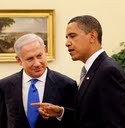The international crisis resulting from Israel's interdiction yesterday of a humanitarian aid flotilla heading toward the blockaded Gaza Strip could have several consequences, few of them good for the United States, the Middle Eastern peace process, and many other parties.
First, the crisis could disrupt the indirect peace talks between Israelis and Palestinians that only just resumed a few weeks ago, after roughly 17 months of false starts and frustrated expectations. Many observers have noted that the Gaza flotilla confronted the Israeli government with a no-win situation. The same could be said for the choices now facing the Obama White House. If it backs Israeli's forceful response -- even silently, by declining to join in the international condemnation -- the Obama administration will weaken its credibility with Arabs as an acceptable mediator. If it criticizes the Israeli action, it will further alienate Israelis and American supporters of Israel, already distrustful of the sincerity and competence of the administration's Middle East policies.
The Memorial Day holiday, the administration's expression of deep regret over the loss of life, and Israeli Prime Minister Netanyahu's decision to cancel a scheduled meeting with Obama in the White House today will only buy a limited amount of time before the administration will be confronted with significant dilemmas, including the potential decision of whether or not to veto a Security Council resolution sanctioning Israel for the incident. The extent of the damage to the proximity talks will become clearer on June 9, when Obama is scheduled to meet with Palestinian President Mahmoud Abbas. Even if the talks continue, the transition to direct negotiations between Israelis and Palestinians looks to be even more distant.

